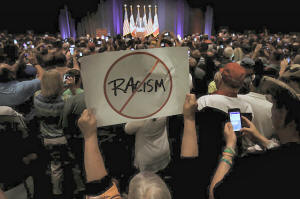|
More Americans say race relations
deteriorating: Reuters poll
 Send a link to a friend
Send a link to a friend
 [April 28, 2017]
By John Whitesides [April 28, 2017]
By John Whitesides
WASHINGTON (Reuters) - Tiffany Cartagena
said she was eating with her mixed-race girlfriend at a restaurant in
Ohio last month when she heard nearby diners remark about the "monkey"
at the next table.
Denver resident Gwendolyn Mami, an African-American, was on a January
flight when another passenger proclaimed President Donald Trump's
proposed border wall would stem the flow of "those people", she
recalled. Allen Dees, a white Louisiana house painter, said two black
men hurled racial slurs at him in March and told him to get out of their
neighborhood.
As Trump nears his 100th day in the White House after a campaign
punctuated by his inflammatory comments about Muslims and immigrants, a
number of Americans say U.S. race relations are deteriorating, according
to a new Reuters/Ipsos opinion poll.
The poll, taken from March 28 to April 3, asked more than 2,800 adults
to rate the danger of racism and bigotry in America. About 36 percent
gave it the worst rating possible, saying they considered racism and
bigotry an "imminent threat" to the country. That is up a few points
from the 29 percent who answered the same way two years ago. (For a
graphic on poll results see http://tmsnrt.rs/2oQAD54)
The White House did not respond to a request for comment on the poll
results.

A majority of the nearly two dozen poll respondents reached by Reuters,
including Cartagena, Mami and Dees, said they have recently sensed an
unsettling rise in racial hostility - or at least a greater willingness
by some Americans to express it.
"I've seen a lot of people become more bold with their hatred and
discrimination," said Cartagena, 29, who is white. A truck dispatcher in
Youngstown and an unaffiliated voter, she cast a write-in vote for
Senator Bernie Sanders for president in November.
Not everyone sees a shift. While about one in four Americans surveyed in
the Reuters-Ipsos poll said "people in my community get along worse than
before," a majority said they had not noticed much change.
"People are always squabbling about things. It's about the same as it
was before," said Miriam Vroman, 84, a retired hospital supply worker in
West Valley City, Utah, who voted for Trump.
Democrats surveyed in the poll were more negative about the perceived
threat from racism and bigotry than Republicans.
Still, respondents from both major parties appeared to be more concerned
about racism than two years ago as racial, ethnic and religious tensions
have flared across the country.

A spate of highly publicized police shootings of African Americans has
strained community bonds. So have deadly mass killings in Orlando and
San Bernardino, California, by assailants inspired at least in part by
Islamic extremist groups.
Some Trump critics say he stoked the enmity with his incendiary campaign
rhetoric, including vows to ban Muslim visitors and deport millions of
undocumented immigrants.
Civil rights groups including the Southern Poverty Law Center and
Anti-Defamation League reported a sharp uptick in incidents targeting
minorities after Trump's election.
Trump has made efforts to close the divide. In a post-election
television interview in November he said he was saddened by acts of
bigotry done in his name and called on perpetrators to "stop it."
As president, he invited the Congressional Black Caucus and heads of
historically black colleges to the White House. He also condemned
anti-Semitic violence.
[to top of second column] |

A protester holds up a an anti-racism sign as Republican
presidential nominee Donald Trump speaks during a campaign rally in
Cedar Rapids, Iowa, U.S., July 28, 2016. REUTERS/Carlo Allegri/File
Photo

'I CAN BE TERRIBLE'
Still, some say the damage is done, and that Trump has emboldened
some people to act on their darker impulses.
"People look to emulate the president. So they think 'if he can be
terrible, I can be terrible'," said Sarah Riffel, 24, a white
law-school student in Houston who voted for Clinton.
Several poll respondents expressed growing unease about race and
civility, even if they had not directly experienced or seen racist
acts.
"People talk to me differently since the election, I get different
looks, different comments," said Clifton McMillan Jr., 31, a black
food delivery worker in Helena, Alabama. "A lot of people are on
edge."
Mami, the airline passenger, says she's become more guarded in
public in recent months. "People feel there is no need to be
politically correct anymore," said Mami, 64, a higher-education
administrator.
It's not just minorities who say they're feeling unnerved. Dees, the
painting contractor from Many, Louisiana, a town of about 2,700
people, said he sensed rising anger among black residents after
Trump's unexpected victory.
"You can just feel the tension building, like something is fixing to
come to a head," said Dees, 46, who did not vote in the November
election. "There is more of a hatred toward white people."
The poll found 46 percent of Democrats surveyed said racism and
bigotry pose an imminent threat to the country, up from 35 percent
two years ago. That figure was sharply lower for Republicans: 27
percent now compared to 24 percent in 2015.

The Reuters/Ipsos poll was conducted online in English in all 50
states. Respondents answered a series of questions, including one
asking them to rate their concern about racism and bigotry on a
scale of 1 to 5, with 1 meaning "no threat" and 5 meaning "imminent
threat."
The poll gathered responses from 1,268 Democrats and 1,008
Republicans. It has a credibility interval, a measure of accuracy,
of 2 percentage points for the entire group, 3 points for Democrats
and 4 points for Republicans.
(Additional reporting by Chris Kahn in New York; Editing by Jason
Szep and Marla Dickerson)
[© 2017 Thomson Reuters. All rights
reserved.]
Copyright 2017 Reuters. All rights reserved. This material may not be published,
broadcast, rewritten or redistributed.

 |